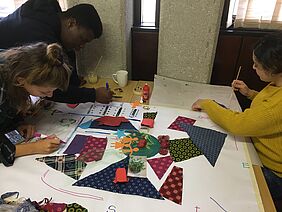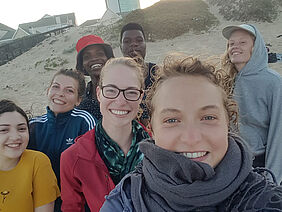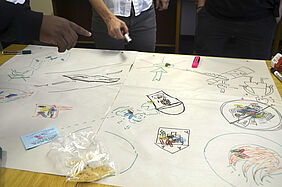A development student, an electrical engineer and a communication designer enter a room … What sounds like the beginning of one of these bad jokes was an important part of our daily life over the last weeks. A part that ended last week with the last course of the Short Learning Programme (SLP).
Over the last nine weeks Tuesdays and Thursdays have been Uni-days. Tuesdays and Thursdays, 1/2 pm to 4 pm. Sometimes longer, especially in the last two weeks, rarely shorter. Our exchange programme was composed of four different SLPs from four different fields. They gave us much needed theoretical insight into Human Settlements and Informal Settlement Upgrading, Development, In-Situ Upgrading and Participatory Design and Action Research.
SLP Human Settlements – Informal Settlement Upgrading
„Housing problems are everywhere.“
This course was pretty much an introduction to everything. We started from the very beginning of humankind, moved to the history of South Africa where we discussed the different mindsets of Africans and Europeans (Is it a plug when I recommend the movie „The Gods must be crazy?“) and ended with the current urban problems of informal settlements and their upgrading.
SLP Fundamentals of Development
„There is not one masterplan for development.“
In lots of discussions, especially in one of the last seminars of this SLP, we finally figured out what our problem is: Everyone had a different, individual definition of development, even after we have discussed development theories, different approaches to it and how to measure development if we can measure it (another huge discussion). But this course was not only about development, it also gave us an insight into doing proper research for a particular Ward (in our case: Ward 4, Walmer Township) and how to use the data base of the Department of Statistics South Africa.
SLP In-Situ Upgrading of Informal Settlements
„Upgrading is not only about housing.“
A town planner who worked for the municipality of Nelson Mandela Bay facilitated the seminars of this SLP. And he started with a question we (or at least I) did not ask ourselves before: Why do we upgrade informal settlements? Moving on from this question we got to know the In-Situ upgrading approach a bit better and how it differs from other upgrading approaches. While other approaches destroy the grown social and socio-economic structure in informal settlements by removing households, the In-Situ approach tries to keep that structure as much as possible.
SLP Participatory Design and Action Research
„Everyone has something valuable to contribute.“
The last SLP-course was actually not a classical theoretical course. Instead we got to know some tools of Participatory Design and Participatory Rural Appraisal (PRA) by trying them out ourselves. What we did in our little group though is usually done with the members of the community you are working with.
You already know about the toy block design process from the last blog entry. In the second part of the SLP (which should have been the first) we mapped our area using different materials while we were trying to remember every resource we recognised. The second step was to collect and prioritise the needs of the community with an outcome that underlined what we learned before: Upgrading or supporting a community is not done by only giving them a nice new house.
The SLPs did not just offer a possibility to learn something new. They also provided a common base for our not just international but also interdisciplinary team. Which brings us back to the very first sentence of this blog: A development student, an electrical engineer and a communication designer enter a room … To be correct I should add two human settlement experts, another development student, two architects, a second electrical engineer and a civil engineer.
We all entered the room for the first SLP as strangers towards us and towards certain topics. We left the room from the last SLP as a real team that not just meet for courses but spend some of their free time together. We not just left with some random knowledge but with new thoughts, new ideas and new inspiration.


